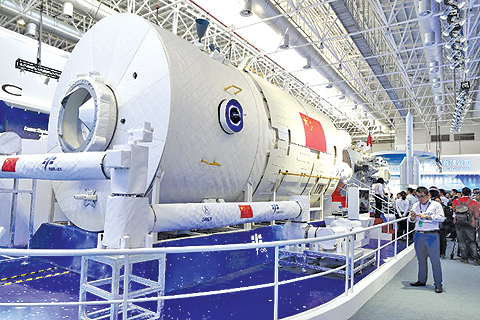Symbolizes the country's major ambitions beyond Earth
 ZHUHAI: A partial model of Chinese space station is seen on display at the Airshow China 2018 in Zhuhai, south China’s Guangdong province. — AFP
ZHUHAI: A partial model of Chinese space station is seen on display at the Airshow China 2018 in Zhuhai, south China’s Guangdong province. — AFPZHUHAI: China yesterday unveiled a replica of its first permanently crewed space station, which would replace the international community's orbiting laboratory and symbolizes the country's major ambitions beyond Earth. The 17-metre core module was a star attraction at the biennial Airshow China in the southern coastal city of Zhuhai, the country's main aerospace industry exhibition. Outside, China's J-10 fighter jet and J-20 stealth fighter wowed spectators as they zoomed across Zhuhai's sky. Back inside, the country displayed its fleet of drones and other military hardware.
Crowds gathered around the cylindrical space station module representing the living and working quarters of the Tiangong -- or "Heavenly Palace" -- which will also have two other modules for scientific experiments and will be equipped with solar panels. Three astronauts will be permanently stationed in the 60-ton orbiting lab, which will enable the crew to conduct biological and microgravity research. Assembly is expected to be completed around 2022 and the station would have a lifespan of around 10 years. The International Space Station -- a collaboration between the United States, Russia, Canada, Europe and Japan -- has been in operation since 1998 but is due to be retired in 2024. China will then have the only space station in orbit, though it will be much smaller than the ISS which weighs 400 tons and is as large as a football pitch.
Billions spent
The country announced in May that the lab would be open to "all countries" to conduct science experiments. "There is no doubt that China will use its station in a similar way as the ISS partners are using their outpost: research, technology and as a stepping-stone for deep-space exploration," said Chen Lan, analyst at GoTaikonauts.com, a website specialized in the Chinese space program.
Research institutes, universities, and public and private companies have been invited to propose projects. Some 40 plans from 27 countries and regions have been received, according to state media. The European Space Agency has sent astronauts to China to receive training in order to be ready to work inside the Chinese space station once it is launched. "I'm sure over time China will be successful developing partnerships," said Bill Ostrove, space analyst with US-based Forecast International consultancy.
"Many countries, and increasingly private companies and universities, have space programmes, but cannot afford to build their own space station," he said. "The ability to put payloads and experiments on a human spaceflight platform is extremely valuable." Beijing is pouring billions into its military-run space program, with plans to send humans to the Moon in the near future. Citing China as a threat, US President Donald Trump has launched plans to create a new "Space Force" to give his country dominance over rivals in space.
Diverse space market
But China's space program has encountered some glitches. A space lab dubbed Tiangong-1 disintegrated as it plunged back to Earth in early April, two years after it ceased functioning. Chinese authorities denied that the lab -- which was placed in orbit in September 2011 as a testing ground for the permanent station -- was out of control. A second lab, the Tiangong-2, was launched into orbit in 2016.
"Despite a lot of talk of the opposite, the United States remains the most dominant power in space right now," Ostrove said. "The most likely scenario for the future is that China will emerge as one of the major space powers," he said. But Russia, the European Space Agency, Japan and India will continue to play "major roles" in space exploration, while private firms are becoming increasingly important in the sector, Ostrove added. "The space market is becoming more diverse," he said, "so it will be difficult for one or two countries or companies to dominate the field in the way the US and Soviet Union did during the Cold War." - AFP









